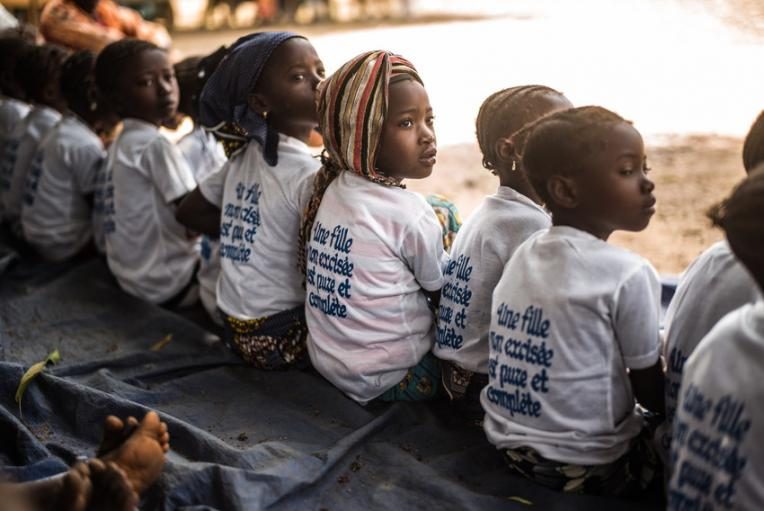23 JULY 2018
Rural communities in Guinea are creating new rituals that bring together the whole community with the aim of abolishing female genital mutilation (FGM), for good.

At the end of the afternoon in this rural community in Guinea, Madeleine Bongui Camara’s megaphone is heating up. And not just because of the sun.
A community facilitator from the NGO AFASCO (Accompaniment of Socio-Community Action Forces), one of Plan International’s partners, Madeleine spares no effort to make her message resonate as far as possible.
“We are joyful! Joyful about abandoning this harmful practice for all women! We are happy and we are proud!”
Madeleine smiles, around her dozens of women dance and sing. This day is historic: after three years of work, the village will today officially celebrate the abandonment of female genital mutilation (FGM). Many discussions, debates and exchanges with authorities, religious leaders and the community cutter have led up to this point.
It takes a village to end FGM
The local cutter is also the centre of attention. Surrounded by dancers, who through song ask her to finally put down her knife, Nantenin Mara dances one last time with the blunt blade that has cut more than 250 girls here during her long career. A blade that, once the dance is over, is dropped into the village latrines.
A few minutes earlier, the mayor of the community, accompanied by representatives of the prefecture, Plan International and AFASCO, formalised the big news in front of hundreds of gathered villagers.
“In view of the consequences of FGM, I am announcing the abandonment and total rejection of cutting in our community, and our commitment to do everything possible to extend this abandonment to the entire district! Do I speak for myself or for everyone?”
“On behalf of all!” The crowd answers.
Celebrating uncut girls
Faced towards the platform where the speeches are taking place and protected from the sun by a large mahogany tree, a group of a hundred girls stand out. All wear a white t-shirt with the message ‘An uncut girl is pure and complete’.
“It is the uncut girls that the village is committed to protecting from this practice,” explains Raphael Kourouma, from Plan International’s ‘Save girls from FGM’ project. “Today’s ceremony does not mean that the work is finished. Every village that gives up FGM is, of course, a victory. But now, the protection structures that we put in place in the village will ensure that the commitment is respected by all the community and to act as needed.”
More than 2,000 girls have been identified as vulnerable to FGM and will be monitored by the community.
The role played by the Imam of the village in the abandonment of the practice was a key element in the process. From the beginning of the project, the imam was involved in discussions with the community and was a strong ally in the work to convince community members.
To symbolise the village’s commitment to renounce FGM, a tree is planted in the mosque garden next to the main entrance. “We hope that in its lifetime, this tree does not see any girl mutilated in our village,” the Imam states when planting the shrub.
For Raphael Kourouma, planting this tree here at the entrance to the mosque is a rare act and sends a very strong message. “All believers who come to the mosque must pass by this tree and will remember the words of the Imam today. It is a way of saying that FGM is not tolerated by religion. This is extremely important in our fight for its abolition”.
Education and communication to end FGM
“Plan International used a gradual and highly structured approach based on generational dialogue, says Raphael. “The principle is to organise, over a cycle that can last more than a year, a series of separate meetings for men, women, elders and young people.”
Each meeting is an opportunity to shed light on the issue from the point of view of the target group. Exchange sessions between the different groups are then set up and then debated again in smaller groups.
The goal is ultimately to educate each group on why others are supporting or preventing FGM and to gain a common understanding of the consequences of the practice, the benefits of abandoning it, and the actions needed to achieve this.
Launched in 2007, Plan International Guinea’s FGM project has worked with 19 communities to formally abandon female genital cutting, protecting thousands of girls from mutilation.
Categories: Education, Sexual and reproductive health and rights


